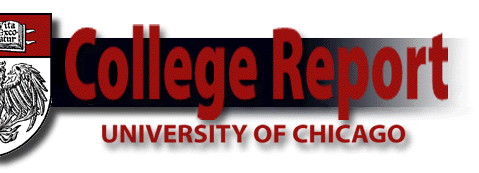 |

Four years
ago, The Gargoyle, the University of Chicago yearbook, turned
to stone because of financial difficulties and lack of student interest,
forcing the classes of ’95, ’96, and ’97 to graduate without a yearbook
to call their own. But this year, The Phoenix rose to take
The Gargoyle’s place.
The brainchild
of executive directors Wendy Chi, AB’98; Christopher Kang, AB’98;
and Jennifer Wu, SB’98, the 186-page Phoenix includes opening,
closing, and advertising segments, plus sections on student activities,
Greek life, housing, fourth-years, and athletics. Scheduled to print
in mid-October, 550 copies of the yearbook will be shipped to the
students, parents, and administrators who pre-ordered, while an
additional 75 copies will be available for $50 each at the U of
C Bookstore.
As late as
last fall, The Phoenix was little more than a spark in the
minds of the executive directors, none of whom had yearbook experience.
Explains Kang:
“Wendy and I had talked on and off during our first three years
about how nice it would be to have a yearbook—something to chronicle
our college days and create a stronger bond between students and
alumni and the University.”
Chi, the Student
Government’s vice president for student affairs, worked to gauge
student interest in a yearbook. After a favorable response at last
fall’s student activities night, she, Kang, and Wu developed a business
plan. Then they set out to determine administrative interest. Support,
Kang says, was “overwhelming.”
After forming
a recognized student organization for The Phoenix, the executive
directors took applications and interviewed for key staff positions,
hiring Heidi Eichler, ’01, as editor in chief, and Shannon Ceci,
AB’98, as business manager. The editorial staff numbered 22, while
the entire yearbook staff included 60-plus students.
More than $30,000
in funding came from advance sales, advertisements, and dedications
purchased by parents of graduating fourth-years. In addition, Student
Government gave the yearbook almost $5,000 for operating and publishing
expenses, while another $2,400 for a computer came from the Committee
on Recognized Student Organizations. The Dean’s Initiative Fund
came through with about $1,800 for a camera.
Kang doesn’t
expect the yearbook to be in the black this year, but hopes that
will come with time. “It was far more work than any of us could
have ever imagined,” he says. “It has been rewarding just to look
back and to see the great strides we made in laying the foundation
for a successful yearbook. In many ways, it was not unlike starting
a new business.”—K.S.
|

